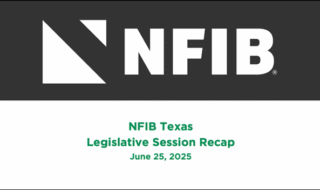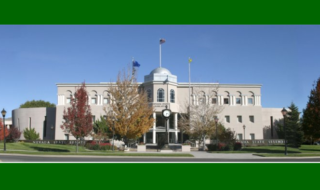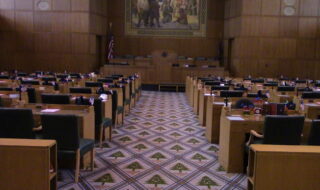April 7, 2025
The high cost of suing oil companies, building housing–Made in California problems
Welcome to the April 7-11 edition of the NFIB California Main Street Minute from your small-business advocacy team in Sacramento.
What Better Than for California to Run Things?
In no other state is the appetite for wanting to devour whole sectors of a free market economy as voracious as it is in California.
It was only a few years ago that the progressives who rule California’s Legislature sought to eliminate private health insurance and bring all medical decisions Californians currently make for themselves in-house, one big DMV for every health-care need, because the one for autos and trucks works so well.
Senate Bill 684 is another example of the progressive mindset at work. Only this proposal suggests California taking control of all the state’s company-run oil refineries.
The measure “… would enact the Polluters Pay Climate Superfund Act of 2025 and would establish the Polluters Pay Climate Superfund Program to be administered by the California Environmental Protection Agency to require fossil fuel polluters to pay their fair share of the damage caused by greenhouse gases released into the atmosphere during the covered period, which the bill would define as the time period between the 1990 and 2024 calendar years …”
What would be done with the money from fund?
In 20 pages of staff analysis provided to the Senate Committee on Environmental Quality, wondering what more needs to be done to mitigate climate change, it suggests, “One possible solution under consideration is state ownership of refineries, in which, ‘The State of California would purchase and own refineries in the State to manage the supply and price of gasoline.’
“If one of the biggest impediments to the state taking ownership of refineries is the upfront cost of acquiring them, what better source of funds than the damages recovered from the companies themselves? If the profitability of fossil fuel infrastructure is essential for its operation by private companies, why not instead operate them—even when unprofitable—as a public good? If California is going to support and uplift the Californians who work in fossil fuel-reliant industries even while fossil fuels are phased out, why not use the profits the companies have generated from their labor to do so?”
There you have it. All thought out for you. What could go wrong?
Last Thursday (April 3), the Senate Committee on Environmental Quality passed SB 684 on a 5-3 vote. It now rests with the Senate’s Judiciary Committee. NFIB opposes SB 684.
Oh, Those Oil Companies …
Get your hands in their pockets before California chases them all away.
As reported in prior Main Street Minutes, Senate Bill 222 “… would authorize a person to bring a civil action … against a party responsible for a climate disaster or extreme weather or other events attributable to climate change …”
In a letter of opposition sent to the bill’s author, Sen. Scott Wiener, last Tuesday (April 1), a coalition of business groups, including NFIB, detailed some big problems with SB 222.
“The bill is still vague and retroactive – newly added intent language refers to alleged activity from the 1950s and 1960s. It bases liability on events ‘attributable to climate change’ without defining ‘attributable’ and without providing any time bounds on attribution.
“Additionally, SB 222 continues to allow a private right of action against energy companies without proof of causation – there is no requirement of any evidence that energy companies’ actions caused the alleged damages. To sue, a person need only allege the damage was the result of a climate disaster. As a result, SB 222 still blatantly violates the U.S. Constitution.”
Now, to the dollars and cents.
“Specifically, SB 222 would, by 2026, increase:
— the price per gallon of gas to $7.89 per gallon, a 63% hike;
— the average household’s costs by $6,200 per year; and
— electricity rates by 31%.”
SB 222 is in the Senate Judiciary Committee.
Housing Construction
“In California, the cost of building a rental apartment is also too damn high,” reported CalMatters last week about a new study from think tank RAND.
“That’s the takeaway of a new study from the research and policy think tank RAND, which found that it costs more than twice as much to build a privately-funded multifamily housing project in California than it does in Texas and 40% more than in Colorado.
“Jason Ward, the lead author, said there’s a constellation of reasons that California costs are so high. Many of them are related to local and state policy decisions. They include bountiful building codes, complicated approval processes, local impact fees, higher minimum wages for construction workers and extensive requirements attached to public funding sources.
“Perhaps most important is the way that all of the above slows things down. In Texas, the typical development timeline is less than two years. In California, it’s more than four.”
Last week’s Main Street Minute mentioned a package of 22 bills legislators are now considering to rectify the housing construction situation.
Fido’s Choppers
“A half-century ago, doctors and other health care providers were also skirmishing over ‘scope of practice,’ the body of state law that defines in great detail which medical professionals can perform which procedures on which parts of the human body,” wrote Dan Walters in his CalMatters column.
“The hardest-fought battle pitted orthopedic surgeons against podiatrists over the legal right to perform ankle surgery, and it raged for years until the latter prevailed. Ever since, there have been similar conflicts too numerous to list, such as psychologists vs. psychiatrists over the right to prescribe drugs, optometrists vs. opticians over eye treatment — and even veterinarians vs. dog groomers over who could legally brush a dog’s teeth.”
Calendar
— April 10-21: Spring Break. Legislature not in session.
— May: Big month of bill deadlines for fiscal and policy committees. Check legislative calendar here.
— May: State budget revise issued by governor’s office.
— May 26: Memorial Day. Legislature not in session.
— June 6: Last Day for Senate and Assembly to pass bills introduced in their chambers.
— June 15: Budget bill must be passed by midnight.
— July 4: Independence Day. Legislature not in session.
— July 18-August 17 Summer recess.
— September 12-January 5, 2026: Interim recess of the 2025-2026 session of the California State Legislature.
— October 15: Last day for governor sign or veto bills passed before September 12.
National
Highlights from NFIB Federal Government Relations Principal Josselin Castillo’s weekly report
— The NFIB Research Center released the March jobs report, which found that that 40% of small business owners reported job openings they could not fill in March and a net 12% of owners plan to create new jobs in the next three months.
— Vice President of Federal Government Relations Jeff Brabant testified before the Financial Services Committee on the harmful impact of the Corporate Transparency Act (CTA) on small businesses and the need to repeal harmful beneficial ownership requirements.
— NFIB President Brad Close joined “The Simon Conway Show” on NewsRadio 1040 WHO in Des Moines, Iowa to discuss the small business economy.
— NFIB filed an amicus brief in Linney’s Pizza, LLC v. Board of Governors of the Federal Reserve System, a case involving the Board’s extremely high limit on debit card fees.
Next Main Street Minute, April 14. All Main Streets Minutes can be found on the NFIB website here. Pull down the California tab in the upper-right-hand corner.
NFIB is a member-driven organization advocating on behalf of small and independent businesses nationwide.
Related Articles














